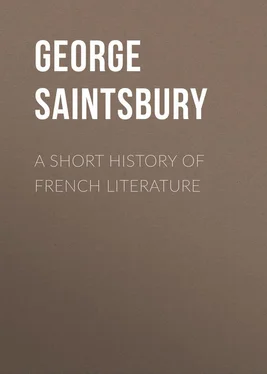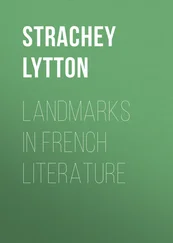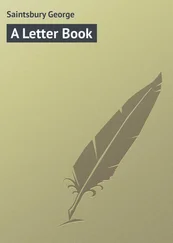George Saintsbury - A Short History of French Literature
Здесь есть возможность читать онлайн «George Saintsbury - A Short History of French Literature» — ознакомительный отрывок электронной книги совершенно бесплатно, а после прочтения отрывка купить полную версию. В некоторых случаях можно слушать аудио, скачать через торрент в формате fb2 и присутствует краткое содержание. ISBN: , Жанр: foreign_prose, на английском языке. Описание произведения, (предисловие) а так же отзывы посетителей доступны на портале библиотеки ЛибКат.
- Название:A Short History of French Literature
- Автор:
- Жанр:
- Год:неизвестен
- ISBN:http://www.gutenberg.org/ebooks/33062
- Рейтинг книги:3 / 5. Голосов: 1
-
Избранное:Добавить в избранное
- Отзывы:
-
Ваша оценка:
- 60
- 1
- 2
- 3
- 4
- 5
A Short History of French Literature: краткое содержание, описание и аннотация
Предлагаем к чтению аннотацию, описание, краткое содержание или предисловие (зависит от того, что написал сам автор книги «A Short History of French Literature»). Если вы не нашли необходимую информацию о книге — напишите в комментариях, мы постараемся отыскать её.
A Short History of French Literature — читать онлайн ознакомительный отрывок
Ниже представлен текст книги, разбитый по страницам. Система сохранения места последней прочитанной страницы, позволяет с удобством читать онлайн бесплатно книгу «A Short History of French Literature», без необходимости каждый раз заново искать на чём Вы остановились. Поставьте закладку, и сможете в любой момент перейти на страницу, на которой закончили чтение.
Интервал:
Закладка:
Social and Literary Characteristics.
In these numerous poems there is recognisable in the first place a distinct family likeness which is common to the earliest and latest, and in the second, the natural difference of manners which the lapse of three hundred years might be expected to occasion. There is a sameness which almost amounts to monotony in the plot of most Chansons de Gestes: the hero is almost always either falsely accused of some crime, or else treacherously exposed to the attacks of Saracens, or of his own countrymen. The agents of this treachery are commonly of the blood of the arch-traitor Ganelon, and are almost invariably discomfited by the good knight or his friends and avengers. The part 40 40 It is very commonly said that this feature is confined to the later Chansons. This is scarcely the fact, unless by 'later' we are to understand all except Roland . In Roland itself the presentment is by no means wholly complimentary.
which Charlemagne plays in these poems is not usually dignified: he is represented as easily gulled, capricious, and almost ferocious in temper, ungrateful, and ready to accept bribes and gifts. His good angel is always Duke Naimes of Bavaria, the Nestor of the Carlovingian epic. In the earliest Chansons the part played by women is not so conspicuous as in the later, but in all except Roland it has considerable prominence. Sometimes the heroine is the wife, daughter, or niece of Charlemagne, sometimes a Saracen princess. But in either case she is apt to respond without much delay to the hero's advances, which, indeed, she sometimes anticipates. The conduct of knights to their ladies is also far from being what we now consider chivalrous. Blows are very common, and seem to be taken by the weaker sex as matters of course. The prevailing legal forms are simple and rather sanguinary. The judgment of God, as shown by ordeal of battle, settles all disputes; but battle is not permitted unless several nobles of weight and substance come forward as sponsors for each champion; and sponsors as well as principal risk their lives in case of the principal's defeat, unless they can tempt the king's cupidity. These common features are necessarily in the case of so large a number of poems mixed with much individual difference, nor are the Chansons by any means monotonous reading. Their versification is pleasing to the ear, and their language, considering its age, is of surprising strength, expressiveness, and even wealth. Though they lack the variety, the pathos, the romantic chivalry, and the mystical attractions of the Arthurian romances, there is little doubt that they paint, far more accurately than their successors, an actually existing state of society, that which prevailed in the palmy time of the feudal system, when war and religion were deemed the sole subjects worthy to occupy seriously men of station and birth. In giving utterance to this warlike and religious sentiment, few periods and classes of literature have been more strikingly successful. Nowhere is the mere fury of battle better rendered than in Roland and Fierabras . Nowhere is the valiant indignation of the beaten warrior, and, at the same time, his humble submission to providence, better given than in Aliscans . Nowhere do we find the mediæval spirit of feudal enmity and private war more strikingly depicted than in the cycle of the Lorrainers, and in Raoul de Cambrai . Nowhere is the devout sentiment and belief of the same time more fully drawn than in Amis et Amiles .
Authorship.
The method of composition and publication of these poems was peculiar. Ordinarily, though not always, they were composed by the Trouvère, and performed by the Jongleur. Sometimes the Trouvère condescended to performance, and sometimes the Jongleur aspired to composition, but not usually. The poet was commonly a man of priestly or knightly rank, the performer (who might be of either sex) was probably of no particular station. The Jongleur, or Jongleresse, wandered from castle to castle, reciting the poems, and interpolating in them recommendations of the quality of the wares, requests to the audience to be silent, and often appeals to their generosity. Some of the manuscripts which we now possess were originally used by Jongleurs, and it was only in this way that the early Chanson de Geste was intended to be read. The process of hawking about naturally interfered with the preservation of the poems in their original purity, and even with the preservation of the author's name. In very few cases 41 41 The Turoldus of Roland has been already noticed. Of certain or tolerably certain authors, Graindor de Douai (revisions of the early crusading Chansons of 'Richard the Pilgrim,' Antioche , &c.), Jean de Flagy ( Garin ), Bodel ( Les Saisnes ), and Adenès le Roi, a fertile author or adapter of the thirteenth century, are the most noted.
is the latter known to us.
The question whether the Chansons de Gestes were originally written in northern or southern French has often been hotly debated. The facts are these. Only three Chansons exist in Provençal. Two of these 42 42 Ferabras and Betonnet d'Hanstone . M. Paul Meyer has recently edited this latter poem under the title of Daurel et Beton (Paris, 1880). To these should be added a fragment, Aigar et Maurin , which seems to rank with Girartz .
are admitted translations or imitations of Northern originals. The third, Girartz de Rossilho , is undoubtedly original, but is written in the northernmost dialect of the Southern tongue. The inference appears to be clear that the Chanson de Geste is properly a product of northern France. The opposite conclusion necessitates the supposition that either in the Albigensian war, or by some inexplicable concatenation of accidents, a body of original Provençal Chansons has been totally destroyed, with all allusions to, and traditions of, these poems. Such a hypothesis is evidently unreasonable, and would probably never have been started had not some of the earliest students of Old French been committed by local feeling to the championship of the language of the Troubadours. On the other hand, almost all the dialects of Northern French are represented, Norman and Picard being perhaps the commonest 43 43 There has been some reaction of late years against the scepticism which questioned the 'Provençal Epic.' I cannot however say, though I admit a certain disqualification for judgment (see note at beginning of next chapter), that I see any valid reason for this reaction.
.
Style and Language.
The language of these poems, as the extracts given will partly show, is neither poor in vocabulary, nor lacking in harmony of sound. It is indeed, more sonorous and stately than classical French language was from the seventeenth century to the days of Victor Hugo, and abounds in picturesque terms which have since dropped out of use. The massive castles of the baronage, with their ranges of marble steps leading up to the hall, where feasting is held by day and where the knights sleep at night, are often described. Dress is mentioned with peculiar lavishness. Pelisses of ermine, ornaments of gold and silver, silken underclothing, seem to give the poets special pleasure in recording them. In no language are what have been called 'perpetual' epithets more usual, though the abundance of the recurring phrases prevents monotony. The 'clear countenances' of the ladies, the 'steely brands' of the knights, their 'marble palaces,' the 'flowing beard' of Charlemagne, the 'guileful tongue' of the traitors, are constant features of the verbal landscape. From so great a mass of poetry it would be vain in any space here available to attempt to arrange specimen 'jewels five words long.' But those who actually read the Chansons will be surprised at the abundance of fresh striking and poetic phrase.
Читать дальшеИнтервал:
Закладка:
Похожие книги на «A Short History of French Literature»
Представляем Вашему вниманию похожие книги на «A Short History of French Literature» списком для выбора. Мы отобрали схожую по названию и смыслу литературу в надежде предоставить читателям больше вариантов отыскать новые, интересные, ещё непрочитанные произведения.
Обсуждение, отзывы о книге «A Short History of French Literature» и просто собственные мнения читателей. Оставьте ваши комментарии, напишите, что Вы думаете о произведении, его смысле или главных героях. Укажите что конкретно понравилось, а что нет, и почему Вы так считаете.












